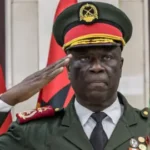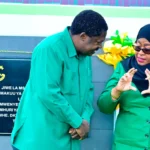A wave of shock gripped Colombia on Saturday after Senator Miguel Uribe Turbay, a rising political figure and likely 2026 presidential hopeful, was shot during a campaign rally in the Fontibón district of Bogotá.
The 39-year-old lawmaker was addressing a crowd in a public park when, according to eyewitnesses, gunfire erupted without warning. The Democratic Center party, to which Uribe belongs, confirmed in a statement that he was shot from behind by an armed teenager, and was immediately rushed to Fundación Santa Fe de Bogotá Hospital.
Doctors at the hospital said he suffered gunshot wounds to the head and leg, requiring emergency neurosurgery and vascular procedures. Two others were injured in the shooting, and a 15-year-old suspect was arrested at the scene carrying a loaded weapon, according to the Attorney General’s Office of Colombia.
In an emotional post shared on Uribe’s official X (formerly Twitter) account, his wife María Claudia Tarazona pleaded with the public to keep her husband in their prayers. “Miguel is fighting for his life. This violence must end. Colombia deserves better,” she wrote.
Uribe Turbay is the grandson of Julio César Turbay Ayala, who served as Colombia’s president from 1978 to 1982. He also carries the legacy of his mother, journalist Diana Turbay, who was kidnapped and killed during a military operation in 1991 while held by the Medellín Cartel.
While many mistakenly associate him with former President Álvaro Uribe Vélez, the two are not related—though they have long been political allies under the same party banner.
Authorities are still trying to determine the motive behind the attack. The young assailant remains in custody and is being questioned, while Bogotá Metropolitan Police and national security forces have launched a full investigation. Initial reports suggest the attack may have been politically motivated, but officials are also exploring links to organized crime or personal revenge.
Also Read; Kenya Confirms 25 Chikungunya Cases in Mombasa
The incident comes at a delicate moment in Colombia’s political timeline. With presidential elections looming in May 2026, Uribe had begun to position himself as a key voice for conservative voters, championing policies on public security, fiscal reform, and anti-corruption. His strong presence on social media and reputation as a reformist had gained him popularity among younger and urban demographics.
President Gustavo Petro condemned the violence, calling it “an act of terror against our democracy.” International support has poured in from regional leaders and global figures alike, including the European Union External Action Service and OAS Secretary General.
Citizens in Bogotá and beyond have gathered in vigils, lighting candles in public plazas and praying outside hospitals. Many say this event is a reminder of the dangerous legacy of political violence in Colombia, a country still healing from decades of armed conflict and assassination.
As Miguel Uribe remains in critical condition, many Colombians are left reflecting on the fragility of peace, the price of leadership, and the courage it takes to speak out in a country still grappling with violence. Whether this tragedy will stall Uribe’s presidential dreams or galvanize national unity remains to be seen.







